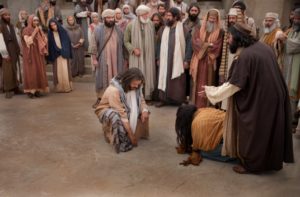 In John 8, the scribes and Pharisees bring Jesus a woman caught in adultery.
In John 8, the scribes and Pharisees bring Jesus a woman caught in adultery.
The scribes and pharisees did this to attempt to trap Jesus. (v. 6)
It’s a trap because the penalty for adultery under the Old Testament law was death, but if Jesus agreed to impose the death penalty, He would get crossways with the Romans, who alone reserved the right to impose the death penalty.
If Jesus showed mercy and didn’t apply the Old Testament law, then the scribes and Pharisees would have grounds for accusing Jesus before the Jews of not following Old Testament law.
Jesus’s response to this conundrum demonstrates He knew the law much better than those who attempted to trap Him: ““He who is without sin among you, let him be the first to throw a stone at her.” (v. 7). It is easy to read this too quickly as Jesus abrogating or superseding the law with mercy, but I do not believe that is what is happening here.
If that were the case one would have to conclude it was against God’s will that anyone ever impose punishment on another under the law unless they themselves were sinless. Also, if Jesus abrogated the law it would also have played into the trap the scribes and Pharisees had set and they could have rightly accused Jesus of ignoring the law of God.
To understand what Jesus means, one must understand Old Testament law. First, there had to be two eyewitnesses to a crime that carried the death penalty. (Deuteronomy 17:6). Second, those two witnesses had to be the persons who initiate the punishment against the accused (i.e. cast the first stone). (Deuteronomy 17:7).
Jesus then was likely not speaking to the entire crowd of people but to the two (or more) eye-witnesses who were biblically authorized to initiate the punishment. Additionally, I believe Jesus was speaking not of all sin but of the sin of adultery. Otherwise, one runs into the problem mentioned above—who could ever enforce laws?
So, when Jesus spoke to the two witnesses, who apparently had committed adultery and they were either shamed into not proceeding (or perhaps not lawfully able to do so), the crowd dispersed and there were left no eyewitnesses to condemn her and initiate punishment.
Jesus, knowing the law (and the hearts of the accusers) better than the scribes and Pharisees, effectively obtained a dismissal of the legal proceedings against the woman caught in adultery. Once the legal accusations against the woman had been dismissed (“Did no one condemn you?”), Jesus stepped back into the role as Lord and Savior and showed mercy to the woman (“I do not condemn you either.”).
The point for this post is that when Jesus assumed the role of a defense attorney He was an excellent lawyer, just as when he assumed the role of a winemaker at the wedding at Cana He made excellent wine. See John 2.
Christians are called to do the same in their work. GS
